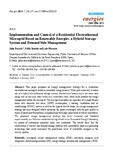Mostrar el registro sencillo del ítem
Implementation and control of a residential electrothermal microgrid based on renewable energies, a hybrid storage system and demand side management
| dc.creator | Pascual Miqueleiz, Julio María | es_ES |
| dc.creator | Sanchis Gúrpide, Pablo | es_ES |
| dc.creator | Marroyo Palomo, Luis | es_ES |
| dc.date.accessioned | 2017-08-09T09:33:56Z | |
| dc.date.available | 2017-08-09T09:33:56Z | |
| dc.date.issued | 2014 | |
| dc.identifier.issn | 1996-1073 | |
| dc.identifier.uri | https://hdl.handle.net/2454/25019 | |
| dc.description.abstract | This paper proposes an energy management strategy for a residential electrothermal microgrid, based on renewable energy sources. While grid connected, it makes use of a hybrid electrothermal storage system, formed by a battery and a hot water tank along with an electrical water heater as a controllable load, which make possible the energy management within the microgrid. The microgrid emulates the operation of a single family home with domestic hot water (DHW) consumption, a heating, ventilation and air conditioning (HVAC) system as well as the typical electric loads. An energy management strategy has been designed which optimizes the power exchanged with the grid profile in terms of peaks and fluctuations, in applications with high penetration levels of renewables. The proposed energy management strategy has been evaluated and validated experimentally in a full scale residential microgrid built in our Renewable Energy Laboratory, by means of continuous operation under real conditions. The results show that the combination of electric and thermal storage systems with controllable loads is a promising technology that could maximize the penetration level of renewable energies in the electric system. | en |
| dc.description.sponsorship | This work was partially funded by the Government of Navarra and the FEDER funds under project “Microgrids in Navarra: design, development and implementation” and by the Spanish Ministry of Economy and Competitiveness under grant DPI2010-21671-C02-01, as well as by the European Union under the project FP7-308468, “PVCROPS-Photovoltaic Cost reduction, reliability, operational performance, prediction and simulation”. | en |
| dc.format.extent | 28 p. | |
| dc.format.mimetype | application/pdf | en |
| dc.language.iso | eng | en |
| dc.publisher | MDPI | en |
| dc.relation.ispartof | Energies 2014, 7, 210-237 | en |
| dc.rights | © 2014 by the authors; licensee MDPI, Basel, Switzerland. This article is an open access article distributed under the terms and conditions of the Creative Commons Attribution license (CC BY 3.0). | en |
| dc.rights.uri | https://creativecommons.org/licenses/by-nc-sa/3.0/ | |
| dc.subject | Microgrid | en |
| dc.subject | Energy management system (EMS) | en |
| dc.subject | Renewable energies | en |
| dc.subject | Grid integration | en |
| dc.subject | Distributed generation (DG) | en |
| dc.subject | Energy storage | en |
| dc.subject | Demand side management (DSM) | en |
| dc.title | Implementation and control of a residential electrothermal microgrid based on renewable energies, a hybrid storage system and demand side management | en |
| dc.type | Artículo / Artikulua | es |
| dc.type | info:eu-repo/semantics/article | en |
| dc.contributor.department | Ingeniería Eléctrica y Electrónica | es_ES |
| dc.contributor.department | Ingeniaritza Elektrikoa eta Elektronikoa | eu |
| dc.rights.accessRights | Acceso abierto / Sarbide irekia | es |
| dc.rights.accessRights | info:eu-repo/semantics/openAccess | en |
| dc.identifier.doi | 10.3390/en7010210 | |
| dc.relation.projectID | info:eu-repo/grantAgreement/European Commission/FP7/308468 | en |
| dc.relation.projectID | info:eu-repo/grantAgreement/MICINN//DPI2010-21671-C02-01/ES/ | en |
| dc.relation.publisherversion | https://dx.doi.org/10.3390/en7010210 | |
| dc.type.version | Versión publicada / Argitaratu den bertsioa | es |
| dc.type.version | info:eu-repo/semantics/publishedVersion | en |
| dc.contributor.funder | Gobierno de Navarra / Nafarroako Gobernua |



